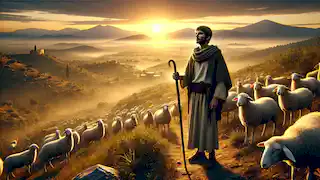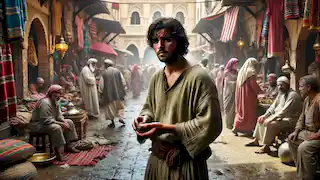The Alchemist
Reading time: 7 min

About this story: The Alchemist is a Fable from Spain set in the Medieval This Poetic tale explores themes of Perseverance and is suitable for All Ages. It offers Inspirational insights. A shepherd's journey to find treasure leads him to discover the true meaning of life.
Introduction
"The Alchemist" by Paulo Coelho is a novel that has inspired millions of readers worldwide with its profound message of self-discovery and the pursuit of one’s personal legend. It is a philosophical book, wrapped in a simple yet enchanting narrative, that tells the tale of a young Andalusian shepherd named Santiago. Through his journey, the novel explores universal themes of destiny, purpose, love, and the spiritual interconnectedness of all things. At its core, it teaches that the fulfillment of one’s dreams is not just about reaching the destination, but also about the lessons learned along the way. Coelho’s lyrical prose blends mysticism and wisdom, making "The Alchemist" a timeless work of art.
Plot Overview
Santiago, the novel’s protagonist, is a shepherd who has a recurring dream about finding treasure hidden near the Egyptian pyramids. His life is initially rooted in the pastoral hills of Andalusia, Spain, where he enjoys the freedom of tending his sheep. Despite his modest lifestyle, Santiago feels there is something greater calling him, especially after having the same dream several times. This dream eventually leads him to a fortune teller in a nearby town, who interprets it as a sign that he should follow the call of his heart and seek the hidden treasure.
Santiago’s journey begins with an encounter with a mysterious old man who introduces himself as Melchizedek, the King of Salem. Melchizedek shares a valuable lesson with Santiago: every person has a "Personal Legend" — a unique destiny that they are meant to fulfill. Melchizedek offers Santiago magical stones called Urim and Thummim, which will help him make decisions on his journey. With the old man’s wisdom and the promise of great riches awaiting him in Egypt, Santiago sells his flock of sheep and sets out across the Mediterranean.

Arriving in Tangier, Morocco, Santiago quickly faces challenges. He is robbed by a stranger, leaving him penniless and far from home. Although disheartened, he finds work at a crystal shop to earn enough money to continue his journey. Through hard work and creativity, Santiago helps the shopkeeper improve his business, learning valuable lessons about perseverance, adaptability, and the importance of following one’s own path. His time in the crystal shop is crucial in building his confidence, and it becomes clear that each step of his journey is part of a larger spiritual awakening.
After saving enough money, Santiago joins a caravan crossing the desert towards Egypt. During the journey, he meets an Englishman who is studying alchemy and searching for the legendary Alchemist, a figure who has mastered the secrets of turning base metals into gold and attaining the "Philosopher’s Stone," a symbol of ultimate wisdom. The Englishman introduces Santiago to the concept of alchemy as a metaphor for spiritual transformation. As the caravan travels, Santiago learns from the desert itself, realizing that nature speaks a universal language that can guide him on his quest.
The caravan eventually reaches an oasis, where Santiago meets and falls in love with Fatima, a woman of the desert. Their love is deep and immediate, and Santiago feels torn between his newfound happiness and his ongoing search for treasure. Fatima, however, teaches him another valuable lesson: true love does not stop one from following their Personal Legend. She encourages Santiago to continue his journey, promising that she will wait for him to return.

At the oasis, Santiago also has a vision of an impending attack, which he shares with the tribal chieftains. When his prediction comes true, Santiago earns their trust and is taken to meet the Alchemist. The Alchemist becomes Santiago’s mentor, guiding him through the final and most dangerous stretch of his journey. He teaches Santiago that alchemy is not just about turning lead into gold, but about turning one’s life into something of great value by pursuing one’s Personal Legend.
As Santiago and the Alchemist travel deeper into the desert, Santiago is tested by various challenges. At one point, the Alchemist demonstrates his powers by transforming lead into gold, but he also teaches Santiago that the real treasure lies within. The journey is not about material wealth, but about spiritual growth and understanding the "Soul of the World," which connects all things.
Eventually, Santiago reaches the pyramids and begins digging for the treasure, only to be attacked by thieves. As they rob him, one of the thieves mocks him by sharing a dream he once had about treasure buried under a sycamore tree in Spain. In a moment of profound realization, Santiago understands that the treasure he has been seeking all along is back in the very place where his journey began — under the sycamore tree at the ruined church in Andalusia.

Santiago returns to Spain, and at the ruins of the old church, he digs beneath the tree and finds a chest full of gold and jewels. The treasure is real, but more importantly, Santiago has discovered that the journey itself was the true reward. His trials, his love for Fatima, and the lessons he learned from the desert and the people he met along the way were the true wealth he was seeking. In the end, Santiago fulfills his Personal Legend, and the novel closes with him setting off to reunite with Fatima, knowing that his heart has always led him true.
Themes and Symbolism
"The Alchemist" is rich in themes and symbolism, much of which draws from ancient spiritual traditions and philosophies. One of the central themes is the idea of the "Personal Legend," a concept that suggests every individual has a unique path or destiny they are meant to follow. Santiago’s journey is emblematic of the pursuit of this personal fulfillment, and the obstacles he faces along the way symbolize the challenges and fears that often prevent people from realizing their dreams.
Another prominent theme is the interconnectedness of all things, which Coelho refers to as the "Soul of the World." Santiago learns to listen to the language of the world, which is expressed through nature, the elements, and even through the people he meets. This concept of unity suggests that the world is a living organism, and by understanding and connecting with it, one can achieve personal and spiritual transformation.
Alchemy itself serves as a metaphor throughout the novel, symbolizing the process of self-improvement and spiritual growth. Just as the alchemist transforms base metals into gold, Santiago’s journey is about transforming himself and discovering the divine within. The Philosopher’s Stone, often mentioned in the novel, is not just a tool for turning lead into gold, but a symbol of attaining wisdom and enlightenment.
Fatima, the woman Santiago falls in love with at the oasis, represents the theme of love as both a guiding force and a test of faith. Through Fatima, Coelho suggests that true love does not require one to abandon their dreams. Instead, it supports and empowers the pursuit of one’s Personal Legend. Fatima’s willingness to wait for Santiago reflects the novel’s message that love is eternal and transcends time and space.

The treasure itself symbolizes the material and spiritual rewards that come with fulfilling one’s destiny. However, Coelho emphasizes that the treasure is secondary to the lessons learned along the way. Santiago’s realization that the true treasure lies within reflects the novel’s spiritual message: the journey is more important than the destination.
Conclusion
In "The Alchemist," Paulo Coelho crafts a timeless fable about the pursuit of dreams, the importance of self-discovery, and the interconnectedness of all things. Through Santiago’s journey, readers are invited to reflect on their own lives and the obstacles that may be standing in the way of their Personal Legends. Coelho’s simple yet profound narrative resonates deeply with readers, offering insights into the spiritual aspects of life and the importance of following one’s heart. The novel’s enduring popularity is a testament to its universal message, which continues to inspire readers to seek out their own personal treasures and embrace the journey of self-transformation.


















